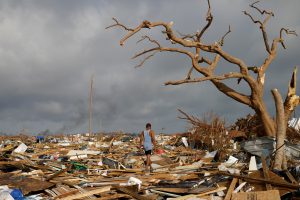
A man walks among debris at the Mudd neighborhood, devastated after Hurricane Dorian hit the Abaco Islands in Marsh Harbour, Bahamas, September 6, 2019. REUTERS/Marco Bello
So wrote CRGC director Melissa Finucane and RAND colleague Joie Acosta in a commentary posted to the RAND Blog.
“In the weeks that follow, the Bahamas will face other crucial choices that will shape its recovery. Time still will be of the essence, but these decisions will have long-term ramifications. And in a way, lives will still be at stake. From other disasters, we’ve learned that well-intentioned early reactions can harm vulnerable groups such as the poor or elderly in the short term—and perpetuate or worsen preexisting inequities in the long run.”
